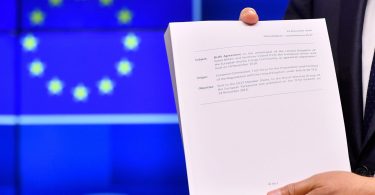The European Union’s ever expanding Brexit financial claims against the UK, now apparently northward of €100bn, have raised their head in the campaign. On 21 March 2017, the Prime Minister gave an interview to The Sunday Telegraph in which she insisted that the UK’s rights must be respected — including its claim to a share of the European Investment Bank — as well as any obligations. David Davis gave an interview to The Sunday Times in which he was dismissive of the EU’s financial demands for €100bn or more and commented: “I’m sufficiently poor to think that €1bn is a lot of money.” He also raised the possibility that the EU’s stance on this and other issues might lead to “no deal”.
We have scrutinised the EU’s Brexit financial claims as they are now being advanced under the European Council’s approved negotiating guidelines. Our new and updated Analysis of the UK’s potential financial liabilities looks at the legal arguments in depth. We have failed to find a credible legal argument either for a liability on the UK to contribute to the EU’s unfunded pension fund deficit, or for any liability to contribute to the EU’s ongoing programmes after Brexit day on 29 March 2019, with the possible exception of an obligation to carry on contributing overseas aid of €1.3bn up to the end of 2020 via the European Development Fund (EDF). But the EDF example is actually helpful to the wider argument that the UK has no ongoing liability at all to contribute to the EU budget, since the funding for the EDF is agreed via a quite different mechanism in which the individual Member States assume direct obligations to fund the programme outside the framework of the EU treaties.
On the other hand, the UK has a firm financial claim to the value of its shareholding interest in the European Investment Bank (EIB) worth about €10bn, although it is likely that the UK’s interest in the EIB and its uncalled capital obligation will have to be unwound together with a proportion of its loan book rather than being “cashed up”.
We have also examined the vexed question of whether there is an international court which has jurisdiction to adjudicate on these financial claims and counterclaims. We conclude that neither the ECJ nor the ICJ (International Court of Justice) has jurisdiction, and indeed neither is an appropriate forum to settle this dispute. On the other hand, it would be possible to establish an ad hoc international tribunal to rule on the dispute in accordance with well-recognised procedures. In view of the strength of its legal arguments, the UK should welcome adjudication of these claims in front of a fair and impartial tribunal. If an impasse over these financial claims causes a blockage in the Brexit negotiations, a possible solution may be to refer the claims and counter-claims to adjudication.
Summary of our Analysis
The summary of our Analysis of the UK’s potential financial liabilities says:-
Although the financial claim likely to be made by the EU27 against the UK as it withdraws from the EU has not been formally set out in public except in very broad outline, it is possible to deduce the principal elements of the prospective claim from public statements and media briefings made by the Commission and European leaders. The following conclusions can be drawn:
(1) The EU’s principal claim appears to be that the UK is obliged to contribute to the EU’s budget, including substantial elements of it representing forward commitments to ongoing programmes, for a period of roughly two years after withdrawal. This claim appears to be wholly without merit in law. This is because the EU’s “Own Resources Decision” and its “Multiannual Financial Framework” are legally subordinate to the EU treaties, have no binding force in law independently of the treaties, and will therefore cease to impose any legal obligation on the UK on the date when the Treaties themselves cease to apply the UK under Article 50 TEU.
(2) The EU’s second claim appears to relate to the large unfunded deficit of its staff pension scheme. The UK could not in any event be liable for a share of that without also having a claim on a corresponding share of the assets of the EU, if a process of valuing the EU’s assets and liabilities and then making or receiving a balancing payment on exit were to be undertaken. However, (A) there is no general practice in international law of states making or receiving balancing payments representing the net assets or liabilities of an international organisation when the join or withdraw from the organisation; and (B) no such balancing payments have been made when Member States (including the UK itself) joined the EEC/EC/EU, so it is hard to see any credible basis upon which the UK could be said to be obliged to make any net payment when it leaves.
(3) The European Investment Bank stands in a rather different position, since the Member States including the UK have paid up capital to this organisation which stands in its books. There is a strong argument that the UK on EU exit is entitled to the return of its paid-up capital and indeed to a corresponding share of the accumulated reserves of the EIB.
(4) It does not seem likely that the adjudication of these claims falls under the jurisdiction of the ECJ under the EU treaties, or under the jurisdiction of the ICJ under its Statute. However, in view of the strength of its legal position, there would be no disadvantage in the UK agreeing that these claims (and the UK’s cross-claims) be referred to adjudication in front of a neutral international tribunal. This might be a possible way of unblocking the impasse which might otherwise arise in the negotiations with the EU if these claims cannot be resolved by agreement, as well as demonstrating the good faith of the UK in being willing to pay sums which are legally owed.
from: https://lawyersforbritain.org/eu-deal-financial-liabilities.shtml







